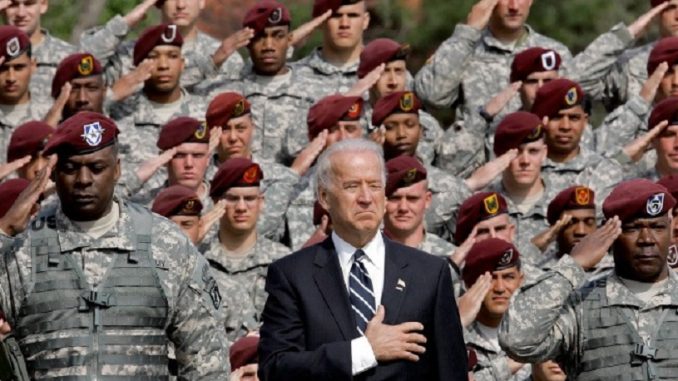Eloquent silences. The left and the imperial elections
We reproduce the following article written by our partnerLuis Meiners and originally published inTempest as a contribution to the debates on tactics and strategy of the left in the face of the US elections.
As the presidential elections approach, issues of electoral strategy and tactics have dominated debates within the American left. A review of the arguments developed by those socialists who call to vote for Biden shows that the majority revolve around the exceptional character of this choice and I know focus on the threat of Trump's authoritarian drive, with marginal references to the theme of US imperialism.
There are three tactics common to most of these arguments circulating, used to address the question of the role of the United States as the dominant imperial and military power. Often, the question of US imperialism and the management of the imperial state is simply left out of the equation entirely. Alternatively, it appears simply as a reference to passing in the middle of the classic arguments in favor of the lesser evil. The third tactic, which is addressed at the end of this article, seeks to mitigate Biden's indisputable "evil" by placing him on the side of democracy against authoritarianism.

In the first and most common approach, the issue of imperialism is not addressed at all and, it is, Thus, a total absence. An example of this is the opinion article of the editor ofNation, Katrina vanden Heuvel, last week in theWashington Post. Nation also published an article signed by dozens of former members ofStudents for a democratic society mid-decade 1960, who was equally silent. In the same line, the former radical of the "New Communist Movement"Max Elbaum barely broaches the subject, except to assuage concerns based on an unsubstantiated claim that there is a "turn" to the left on foreign policy issues. And beyond a passing reference to Trump's nuclear policy, a letter on ZNet signed by "55 Radicals" asking to vote for Biden and then fight Biden, does not contain an assessment of the role of US imperialism in the world. Of the current generation of the «new new left», a more indirect letter in support of the vote for Biden fromcurrent members of the DSA leadership remain equally silent.
The second tactic involves a passing recognition of Biden's "badness.", including his complicity in the administration of the American empire, but it takes very little account of the issue in the overall balance. In this sense, the editor ofNew Politics, And LaBotz, explaining why you signed the ZNet letter, acknowledges that Biden is "disgusting" and that the Democratic Party remains an "imperialist party", but it does little to address what it means for the left and its anti-imperialist and anti-war perspectives, support this candidate and this party.Stephen Shalom YBarbara Ransbymake similar explicit calls to choose the lesser evil in their respective articles, but with the same omissions.
The empire in their minds
The relative absence of this aspect of the discussion on the socialist left contrasts with the acute awareness of the ruling class about the importance of this issue.. A recent example is the editorial of theNew York Times titled«End Our National Crisis» (End our national crisis). This establishment spokesman presents a clear case of why he considers Trump as "a man unworthy of the position he occupies": "Trump's ruinous term has already seriously damaged America at home and around the world ... We have criticized his vandalism of the postwar consensus, a system of alliances and relationships around the world that took many lives to establish and maintain «.
Biden addressed this very issue in his acceptance speech on the closing night of the Democratic Party convention.. In the same line, more of 70 Senior Homeland Security officials published apaper in which they expressed their concern for "the security of the nation and its position in the world under the leadership of Donald Trump" and expressed their conviction that "Joe Biden has the character, the experience and temperament to lead this nation. We believe it will restore the dignity of the presidency, will unite americans, will reaffirm America's role as a world leader and inspire our nation to live up to its ideals. ”This statement has now been signed by others 60 senior officials, they all served under Republican administrations.
The growing crisis of the neoliberal world order and the context of growing inter-imperialist rivalries provide the backdrop for establishment concerns.. The question of US imperialism and its strategic orientation should have at least the same weight in the concerns of the US left that it obviously has for the ruling class.. In fact, Much of the growing support that Biden has garnered from both Wall Street and the state apparatus is related to precisely this question.. The politics of imperial restoration are at stake.
From the unipolar world to inter-imperialist tensions
A quick review of the dynamics of US imperialism in recent decades illustrates the challenges of the present moment. With the end of the Cold War and the collapse of the Soviet Union, the post-WWII world order collapsed. US imperialism sought to reorganize the world system to establish a new basis for its hegemony. This meant both acting as a global gendarme and incorporating the states into the international framework of institutions and trade agreements that had been built for that purpose.. Thus arose the "Washington consensus", a strategy to which both capitalist parties in the United States were fully committed.
Events would prove that a unipolar new world order was not easy to establish or maintain.. The collapse of the postwar world order meant that US imperialism was left alone at the forefront of efforts to control and resolve the conflicts and contradictions that arose.. Despite attempts to rehabilitate a "humanitarian" imperialism in Iraq, in 1992, and the Balkans throughout the decade, there was an increase in class struggle with mass movements against neoliberal globalization and the institutions of American hegemony from Seattle to Genoa. At the end of the decade of 1990 and early 2000 a series of rebellions in Latin America rocked several US-backed governments, and hit the imperial project of hegemony in the region that the United States held decades ago.
Bajo George W.. Bush, US imperialism tried to consolidate its hegemony by strengthening control over the Middle East. The strategy envisioned rapid wars and regime changes in Afghanistan and Iraq., taking advantage of the opportunity after 11 September to justify more militarism. These, at the same time, serve as a platform for greater control over the region and its strategic resources. This offensive in the Middle East led to almost two decades of seemingly endless wars and the weakening of the geopolitical position of the United States..
But the main change in the global playing field would come fromChina's rise to a global and imperial power. In fact, the China question figured prominently in the motivations of theBush government to invade Iraq and Afghanistan. As the United States faced increasing difficulties in the first decade of the millennium, accentuated by the crisis of 2008, China advanced and consolidated its international position, becoming the main trading partner for much of the world and an increasingly important source of foreign direct investment. The "Silk Road" initiative is the most ambitious example of China's new role in the world economy.
China's development towards a major capitalist economy and imperialist power is not without contradictions. While its huge trade surplus has allowed it to accumulate massive reserves, faces structural problems of over-accumulation and over-production that a depressed and pandemic world economy will only accentuate. The underlying contradictions of its economy fuel the need for its expansion abroad. This has set in motion the dynamics of the inter-imperialist conflict on a global scale..
Obama's "turn to Asia" was a response to this situation. It involved shifting both diplomatic focus and military resources toward the effort to isolate and contain the emerging imperialist rival.. Nevertheless, this change was not achieved successfully.
Trump's "illiberal hegemony"
This was the context in which Trump came to power, based in part on his open challenges to the bipartisan consensus on the use of US military power abroad and promising to "drain the swamp" of the establishment. Throughout your presidency, there have been several moments of open collision with the establishment on foreign policy: controversies over the withdrawal of troops from Syria, on the relationship with NATO, the resignation of James Mattis as Secretary of Defense, among others. Trump's unilateralism and the undermining of the traditional alliance system, exemplified in its withdrawal from multilateral trade and environment agreements, have come under scrutiny from both Democrats and Republicans. He has also been criticized for his focus on Russia and China.. The first led to an investigation by the Special Prosecutor into Russian influence in the elections of 2016 and was part of the arguments presented by the Democrats during the impeachment attempt that began in 2019.
Trump's Seemingly Erratic Behavior Has Been Considered a Threat to America's Interests. But there is an underlying logic behind his style that is related to the challenges posed by the crisis of US imperialism and the rise of China as a major competitor on a global scale.. That is why there is a break and continuity with previous administrations in terms of foreign policy.. Trump has moved from containment to a more open confrontation when dealing with China, as evidenced by the replacement of the Trans-Pacific Treaty by a trade war.
Trump's attempt to secure US imperialist interests has been described as "Anti-liberal hegemony". Despite his isolationist rhetoric, Trump has continued to pursue the global interests of American capital, although in a way that partially departs from the established consensus. Until a certain point, has presented a cruder version of US imperialism, stripped of ideological decoration.
Trump's more aggressive and unilateral approach alienated traditional allies. In doing so, has effectively weakened the international position of the United States. Hence the anxiety of the ruling class and the state apparatus. His growing support for Biden shows that there is a consensus that a return to a more "multilateral" approach, covered under a democratic flag, it is a more effective way of promoting US imperialist interests in the current world situation.
"Rebuilding the Instruments of American Power"
The events described in this brief overview of the past decades were already significant enough to arouse the anxiety of the American ruling class., but then came the COVID-19. The lack of a coordinated response to the pandemic, attacks on the World Health Organization (WHO) and state and local governments fighting for critical medical supplies, they are testimony to the profound crisis of the world order led by the United States. The "Greatest Election in American History" narrative must be read in the context of this situation to fully understand its significance..
Echoing this sentiment, Biden vows to restore America's leadership in the world. It is fully in tune with the concerns expressed by the National Security apparatus. Against the unilateral "America first" approach, expresses the need for the United States to regain its position with its traditional allies to form a solid foundation to "get tough" with new and old rivals on the world stage.
Its campaign clearly reflects both the understanding that the United States must face a world of greater instability and interimperialist competence and the awareness that its relative weakness means that it cannot do it alone. This translates into strengthening the alliances system that Trump has undermined. InAn article published inForeign Affairs, Biden Afirma:
The Biden foreign policy agenda will return to the United States at the head of the table, in conditions of working with their allies and partners to mobilize collective action on global threats. The world does not organize itself. During 70 years, U.S, under Democratic and Republican presidents, played a leadership role in writing the rules, the creation of agreements and to give life to the institutions that guide the relations between the nations and promote collective security and prosperity, Until Trump. If we continue to renounce that responsibility, Then one of two things will happen: or someone else will take the place in the United States, but not in a way that promotes our interests and values, or nobody will do it, and chaos will occur.
Faced with the growing competition with China, Biden represents the interests of the American ruling class and its state. In the attempt to do so in a way that I manage to support both in the country and abroad, The democratic party candidate speaks the language of the fight against authoritarianism. In a vocabulary reminiscent of the Cold War and World War, Talk about the need to build a coalition in defense of democracy, explaining inForeign Affairs:
China represents a special challenge ... China is playing long term extending its global reach, promoting its own political model and investing in the technologies of the future ... the most effective way to face that challenge is to build a united front of American allies and partners to face abusive behaviors and human rights violations of China.
One of the main elements of its platform is the call to a "Summit for Democracy", that seeks to bring together the main international actors under the leadership of the United States behind the flag of democracy.
Fighting fire with fuel
That this agenda presented by Biden and the Democratic Party coincides with the concerns and rhetoric of the American ruling class and the state apparatus is not surprising. The surprising thing is that a sector on the left is framing the elections in similar terms. The recurring theme of voting for Biden to stop authoritarianism, Fascism or a coup d'etat, It is used by both the establishment and by the left. To what extent this is a dead end has been addressed in Other contributions a is debate.
A recent article of Neal Meyer and Eric Blanc takes the argument a step further through its projection on a world scale:
The Socialists In the United States we must recognize our international responsibilities. As internationalists, We have the duty to contribute to the defeat of a president who has emboldened to the extreme right worldwide ... A devastating defeat for Donald Trump in November will be a significant contribution to change that international dynamic.
This argument accepts as its own the idea that voting for Biden will contribute to stop the extreme right both within the USA. THE. as worldwide. In doing so, It does not address the underlying social and political processes that have led to greater polarization and that have opened the door so that the extreme right becomes a stable presence in the international political scenario. The conditions that allowed the extreme right to be emboldened are indissolubly linked to the policies that people like Biden have promoted in recent decades. At best, A biden presidency would contribute to reproduce these conditions. Postulate that a dynamic deeply rooted in the crisis of the prevailing model of capital accumulation and its political representation can be changed by voting to Trump is, in the best case, An illusion. Proposing fighting the extreme right voting for Biden is like trying to fight fire with fuel.
There is an additional danger in accepting the idea that voting for Biden can contribute in some way to go back to the extreme right internationally. The arguments made by the Democratic Party to frame its foreign policy approach approaches dangerously closer, what, As we have described, revolves around the defense of democracy.
Finally, and related, Blanc and Meyer are also entertaining illusions if they believe that the restoration of the presidency of Joe Biden is somehow an automatic benefit for the many fronts of the anti -imperialist struggle worldwide. There is a reason whyThe generals and thenational security apparatus They are joining the former president and three times leader of the Senate Foreign Relations Committee.
The elections and then
The current international situation has its roots in a deep crisis of capitalism. The crisis of the neoliberal world order is an expression of this. More than a decade has elapsed since 2008. In her, We have seen greater polarization and radicalization. Pandemia will accelerate these trends. The regional wars and the increasingly open inter -imperialist rivalries will be a clear characteristic of the coming period. Rebellions will probably shake even the most stable regions in the world.
The American ruling class is developing strategies to respond better to this, since it faces structural contradictions rooted in the dynamics of both the world economy and its own capitalist accumulation. Like Ashley Smithhas pointed out:
The United States is caught in a strategic contradiction. Has suffered a relative geopolitical decline within the neoliberal order of globalization and free trade. It has also suffered a relative economic decline ... but US capital remains integrated to the world system and committed to the globalization of free trade. Thus, The American State cannot continue with globalization as usual, nor choose to go towards protectionism as Trump administration seems to prefer.
The debates in the American left with respect to the elections and beyond must address this reality. An American imperialism in decline, a global competitor as China and a world in growing agitation, All point in the direction of an increasingly aggressive position. It is not a coincidence that the electoral debates around foreign policy have essentially turned around who can be harder with China.
By rejecting Trump's right -wing project, The left cannot simply leave out of its analysis what the establishment says openly: Biden expresses a political project that intertes bourgeois democracy and imperial restoration. And in doing so, more effectively represents the interests of the ruling class at the current situation, returning the "liberal" varnish to imperialist hegemony to save it. Internationalism must be based on a clear anti -imperialist policy, more urgently in the heart of the empire. The socialist left must recognize and argue that, As history has demonstrated again and again, Minor evils have never been guarantee of a less virulent and dangerous empire.




